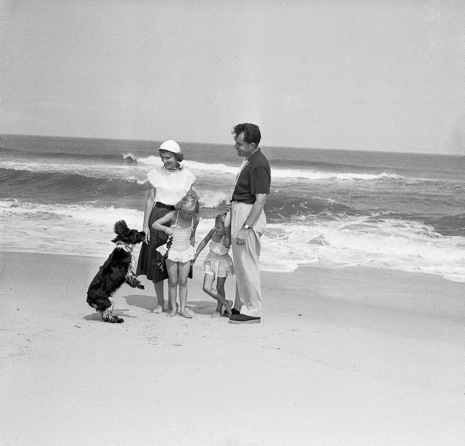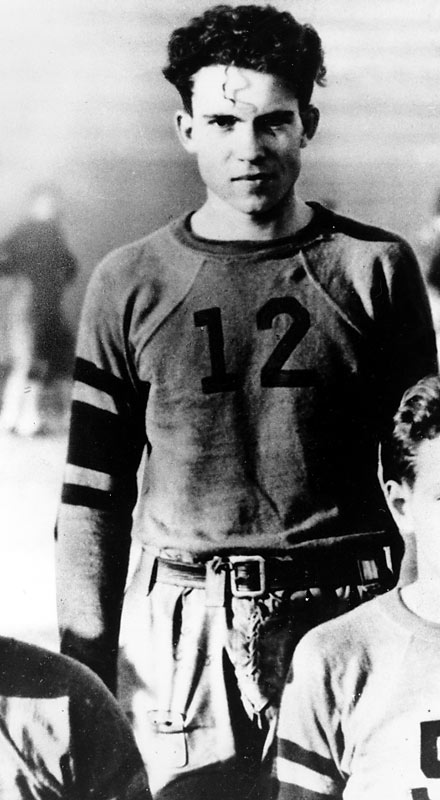 Nixon on the beach is smiling, a young looking forty. Pat is smiling. Neither are looking at the camera or seem self-conscious. Their dog Checkers, later to become a prop in a famous speech, is performing. Dressed casually, his hair ruffling in the breeze, he looks more contented than I have ever seen him, at ease with his family in the Jersey sun.
Nixon on the beach is smiling, a young looking forty. Pat is smiling. Neither are looking at the camera or seem self-conscious. Their dog Checkers, later to become a prop in a famous speech, is performing. Dressed casually, his hair ruffling in the breeze, he looks more contented than I have ever seen him, at ease with his family in the Jersey sun.
He was the great vampire of my youth, the genius golem, the insidious presence, the ungainly, always tense Machiavel, the conspirator, the paranoiac, the embodiment of a sweaty, resentful American id. But here, center-framed against a wide ocean and beach, he looks like a regular guy, another WW II veteran making up for lost time and enjoying the moment — he survived the war, he has lovely daughters, his wife looks happy.
The August, 1953 photo came as a shock.# Maybe, as my wife said, it was a pose, an image to align him with Jack Kennedy’s Cape Cod photos. I don’t think so though. Nixon was Vice President and potentially Eisenhower’s heir. Kennedy was a just elected junior Senator; he didn’t marry Jackie, a woman whom the camera loved, until September of 1953. His beach-strolling publicity didn’t begin until the late 50’s as his desire to become President was transformed into a campaign. No, I think the photo caught Nixon at a moment of genuine happiness that had nothing to do with the political game of image manipulation.
The photo reverberated in tandem with Norman Rockwell’s official Presidential portrait , a particularly lifeless, impersonal picture. Nixon looks like a small town banker that Rockwell tried too hard to make look benign. I pulled up other images and found one of him from high school. As silly as it sounds, Nixon was one of those figures I never imagined as young. He seemed trapped in one frozen tableau after another – walking on the beach in a suit and wingtips, sitting in an enormous chair and smiling at Mao, assuring us in rank speech after speech that he was guilty of nothing. But here he looks steadily at the camera with a gaze I have seen countless times as a teacher – an intelligent kid, a striver, darkly handsome, his intensity thrumming out from his eyes and posture as if intensity alone could carry him into a good life. He is unafraid of the camera, more confident than I ever remember seeing him as an adult.
particularly lifeless, impersonal picture. Nixon looks like a small town banker that Rockwell tried too hard to make look benign. I pulled up other images and found one of him from high school. As silly as it sounds, Nixon was one of those figures I never imagined as young. He seemed trapped in one frozen tableau after another – walking on the beach in a suit and wingtips, sitting in an enormous chair and smiling at Mao, assuring us in rank speech after speech that he was guilty of nothing. But here he looks steadily at the camera with a gaze I have seen countless times as a teacher – an intelligent kid, a striver, darkly handsome, his intensity thrumming out from his eyes and posture as if intensity alone could carry him into a good life. He is unafraid of the camera, more confident than I ever remember seeing him as an adult.
I want to know what went on inside him. In Thomas Mallon’s novel Watergate*, Alice Roosevelt Longworth, Teddy’s daughter, confronts Nixon after his resignation and tells him that, “If I let myself be swallowed by one personality, you hid yourself behind dozens of them, one new Nixon after another.” In a slightly different context David Thomson refers to the quality of “phantom elasticity,” the ability of someone to shift from persona to persona as if nothing anchors him or her to a knowable life. Who was he?
I want a Shakespearean vision of Nixon, not an op-ed version, not a version that makes him into a merely symbolic figure. So I want a good novelist or a playwright to take him on. I place more trust in their view of individuals and life than most others. I’m not looking for an apologist or a prosecutor but for an artist to show how Nixon, the individual, might have struggled with ambition and fear and both grave, bone-breaking defeats and the unseen consequences of victory, or how the adolescent Nixon I see on the football field acquired the “lean and hungry look”** that haunts his images as President.
At 60 I am receiving a daily cure of my youthful infection of self-righteousness and my certainty that I had things figured out. Whereas before I imagined him as a schemer without any moral center, now I can see that Mallon’s suggestion may be more believable, more representative of what actually happens inside us when we make terrible choices — that Nixon might have awakened one day in late 1972, stunned, paralyzed, drowning, suddenly aware that one or two orders he had given so recklessly and thoughtlessly might have buried him up to his neck in shit. I know how that feels. Led by our panic or defiance or our wish to avoid a fall, we make decisions that might come to define our whole lives … and then it is too late.
#The photo appeared in the February 4, 2013 edition of The New Yorker.
* This is worth reading. It circles Nixon at a distance and gives nuanced, sympathetic portraits of his wife, Pat, of Fred Larue, the ‘bagman’ of Watergate, and of Howard Hunt, the ex-CIA agent implicated in the original break-in.
**Let me have men about me that are fat,
Sleek-headed men and such as sleep a-nights.
Yond Cassius has a lean and hungry look,
He thinks too much; such men are dangerous.
Julius Caesar, I, ii, 190-195
You might like to look into John Adams’ opera “Nixon in China” – libretto by Alice Goodman. I have yet to see it live, but the music is striking and Adams’ account of its creation is fascinating.
http://www.earbox.com/W-nixoninchina.html
http://www.metoperashop.org/shop/nixon-in-china-live-in-hd-dvd-and-bluray-10217